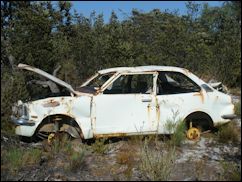The nation’s roads and bridges have a feevah and Josh Voorhees has a cure: mo’ money for the federal Highway Trust Fund. Writing in Slate, Voorhees highlights Congress’ inability to find new revenue sources to replenish the fund, which faces an $18-billion-a-year shortfall every year over the next decade.
“Current tax rates—18.4 cents per gallon of gasoline, 24.4 cents per gallon of diesel fuel—aren’t enough to prevent America’s roads from crumbling and bridges from collapsing,” he writes. Bridges are structurally deficient, he reminds us, urban highways are congested and too few Americans have access to mass transit. Adding urgency to the situation, he notes that America’s road system is ranked only 18th globally — the U.S. is losing its economic competitiveness!
The good guys in his article are those who implemented, or at least advocated, higher federal taxes for transportation. Alas, he laments, “Recent history suggests such days of good policy winning out over good politics are behind us.”
The fact is, there hasn’t been good transportation policy at the federal level for the decades. The federal gas tax, enacted by Herbert Hoover, was necessary to pay for construction of a system of national highways. That it did, quite successfully. But federal programs never declare, “Mission Accomplished.” They morph into something new. And the “Highway” Trust Fund has evolved into a program that doesn’t just underwrite construction and maintenance of highways but one that subsidizes mass transit and all manner of other non-road spending, not the least of which is the cost of administering the federal program itself.
The best thing Congress can do is dismantle the federal transportation bureaucracy and transfer the gas tax revenue to the state transportation bureaucracies. It is axiomatic here in Virginia that federal money bogs down the lengthy approval process for transportation projects with even more bureaucratic process and, thanks to the strings attached, runs up the construction costs. Cutting Uncle Sam out of the loop would save both time and money.
I harbor no illusion that states are any less likely to spend money on boondoggles than Uncle Sam. While the states are closer to “the people,” they are also closer to developers and other special interests who lobby for projects that benefit them at the expense of the public. But cutting the federal strings and overhead at least would make the boondoggles cheaper.
The conventional wisdom conveyed by Voorhees’ article is riddled with other assumptions that I do not accept such as, for example, the notion that the federal government should do more to offset maintenance under-funding. The under-funding of maintenance is a problem, perversely enough, that the Highway Trust Fund helped create. The program entices states to undertake expensive mega-projects by sharing the up-front capital cost. States leap for the “free” money to help cover the up-front costs — the problem is especially prevalent with mass transit projects — oblivious to the fact that new capacity adds to ongoing maintenance and operations costs. States overbuild their transportation systems, maintenance & operations obligations escalate, and they scrimp on repairs to find money for the next new project.
Another issue: In the business world, corporations continually review their portfolios of assets, sloughing off divisions and subsidiaries that don’t justify continued investment. When was the last time the state or federal government ever reviewed its portfolio of transportation assets? Once a road gets built, it never gets downsized. How many lane-miles of highway serve counties with dwindling populations? How many country roads revert from paved to gravel? The United States has erected a system that only grows and never retracts. As long as Uncle Sam is doling out cash, states have little motivation to reconsider.
These and other travesties can happen only in a country in which citizens are convinced that “someone else” should pay to build and maintain everything from city streets to highways, bicycle lanes to light rail lines… a country in which there is no accounting for life-cycle costs… a country in which transportation planning is divorced from land use planning… a country in which accountability for results is diffused between federal, state and local governments…
I don’t mean to pick on Voorhees — many others think as he does — but the idea that raising taxes is the default solution to our nation’s transportation challenges is ludicrous beyond words. The transportation system does need more investment. But until the ramshackle structure for financing highways, bridges and rail is fixed, Americans should have no confidence that the money will be well spent.



